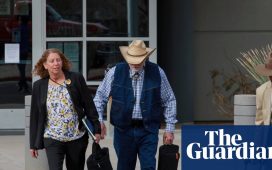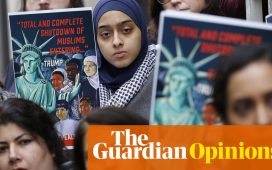Kelly Lytle Hernández grew up seeing the effects of the immigration and law enforcement system first-hand. Her upbringing has driven her groundbreaking work as a historian, documenting the creation and expansion of border patrol and how Los Angeles came to operate the largest jail system in the world. Her most innovative project, Million Dollar Hoods, has mapped the nearly $1bn cost of incarcerating 17,000 people in LA.
The 45-year-old University of California, Los Angeles (UCLA), professor recently added “genius” to her résumé, as a recipient of the prestigious MacArthur Fellowship award. She’s working on a new book about a group of Mexican intellectuals and workers who launched a revolution when they came to the United States in the early 20th century, driven out of Mexico by the dictator Porfirio Díaz.
The activist scholar talked to the Guardian about challenging the field of history and what prison abolition means to her. The conversation has been condensed and edited for clarity.
Can you tell me about growing up in San Diego and the memories that stick with you in your work today?
One powerful memory is from elementary school, around third grade. I was on the school yard with a friend who was weeping because her uncle had been taken the night before to be deported. Being with her in her grief and trauma was incredibly impactful. I did not live with that fear because I don’t come from an immigrant family. But that pain ripples across the border. We all live inside of that trauma and we’ve accepted it as normal, but it’s not normal.
That experience helped me understand what happens when someone is taken away – the aftermath for the family, for the community. It also helped me to see what was happening in my own community. Every time a young black male in particular, but young women as well, were taken away, I understood it in relationship to our own history as African Americans, but also in terms of the regime that I was watching so powerfully around me disappear people daily through deportation. I’m full of stories of being sat on the curb, being accused of being a gang member, being put on a gang list, having my locker opened up and searched for drugs. All of that drives the work I do.
You’ve talked about building a “rebel archive” to document the history of incarceration. What does that term mean to you?
A “rebel archive” includes the voices and the acts of the people who fought the rise of mass incarceration, the rebels themselves.
It’s also the set of records that evaded police destruction across centuries. The LAPD and LA sheriff’s department run the jails of LA and have destroyed the vast majority of their records. I had to go and find whatever record did survive – in newspaper articles, legal battles, in songs that had been written by migrants about their experiences with incarceration, in photographs, in pamphlets, all these different places. The point was to look beyond traditional places, to hear the voices, to incorporate the lives of people who have been rebellious and marginalized.
What have been the biggest obstacles in developing Million Dollar Hoods?
Million Dollar Hoods is a big data project. We map how much is being spent on incarceration per neighborhood in Los Angeles, and we’re now expanding to other jurisdictions. I had to acquire arrest and jail booking data from law enforcement agencies. It was extraordinarily difficult.

Every time a law enforcement agency told me no, that just drove me even more. I knocked on door after door for almost a year just to get first data set. My position is that when we are legally entitled to data, we are going to demand it rather than negotiate for it. A negotiation often involves writing away some of your freedoms.
This project also thrives, because we are training a new generation of black, brown, indigenous, first-generation students in the field. I’m not sure how many top universities have data science classes that look as diverse as ours.
What do you want people to take away from these maps and what you have uncovered so far?
In some communities in Los Angeles, we’re spending over a million dollars per year locking up local residents and that is money we are throwing away. The vast majority of charges are drug possession and DUI. Those are public health crises. So when you see those neighborhoods light up in red, you know that is a community that needs to have a significant shift in how public resources are spent – away from policing, incarceration and into social and family support services.
What’s it going to take to have that shift on a large scale?
I think about this over the long arc of time – understanding that mass incarceration comes out of the colonization of the American west, the occupation of indigenous land, the end of enslavement. These are core problems around belonging and race in the United States.
There is no singular policy solution to the problem of mass incarceration, mass deportation, the carceral state. We need to have an extensive process of truth, reparation and reconciliation where the world of possibilities is opened anew for us. Right now, I don’t think we have the capacity to imagine the solution to the extraordinary problems. We need a mass public education campaign about the harms that have been done, the assets that have been stripped, the families and communities that have been strategically damaged and ripped apart across the arc of the American story.
You identify as a prison abolitionist, correct? Can you tell me what that means to you in 2019?
I do consider myself an abolitionist. What I think is most important is to not center on prison but to rather focus on the support services that we need outside of prisons to ensure thriving families and communities. What is happening inside is incredibly important, but I also spend a lot of time talking about what families need. It comes back to housing, employment, education, healthcare, mental and physical wellbeing. My focus is making sure that we amplify what we need so that we can squeeze out what we don’t.
What do you think are the biggest stories about the carceral system that the media is missing or that the public doesn’t understand?
We’ve done a wonderful job of bringing more attention to the crisis at the US-Mexico border and the children and families who are being locked up and impacted and locked out. I hope that we can also use this moment to talk about the children of the imprisoned, and the trauma that the loss of a parent can involve. I hope that we can build from this to consider all of these communities that have been so deeply impacted by the carceral state.

I also think it would be fantastic if every person in the United States would know whose land they are on, and the history of occupation, war, of relocation, of treaties, of broken treaties. If every person in the United States could have a sensibility of the history of the land that they occupy, I hope that would open up new opportunities for our conversation about racial justice.
What does it mean for the MacArthur Foundation to honor someone like you who is an “activist historian” or “movement-driven scholar”?
The academy has taken great strides in acknowledging and valuing socially engaged, movement-driven work. But there’s a lot more work to be done to actually seed and sustain this kind of work, which is rigorous and scholarly, deeply archival, grounded in the literature – and is also responsive to concerns and demands of contemporary social movements.
When I wrote my first book, Migra! A History of the US Border Patrol, many scholars doubted me and questioned why I wrote this as a story of race in America. Growing up on the US-Mexico border, it never dawned on me there was another way to tell this story. But the academy wasn’t there yet, they were stuck on questions of immigrant incorporation and Americanization. But my own experience was telling me something different.
What I’m trying to emphasize is that we should be accountable to the questions that are happening in the public, not just within our peer-reviewed journals. In my work, we are accountable to the communities that are most impacted by mass incarceration and mass deportation, period.






